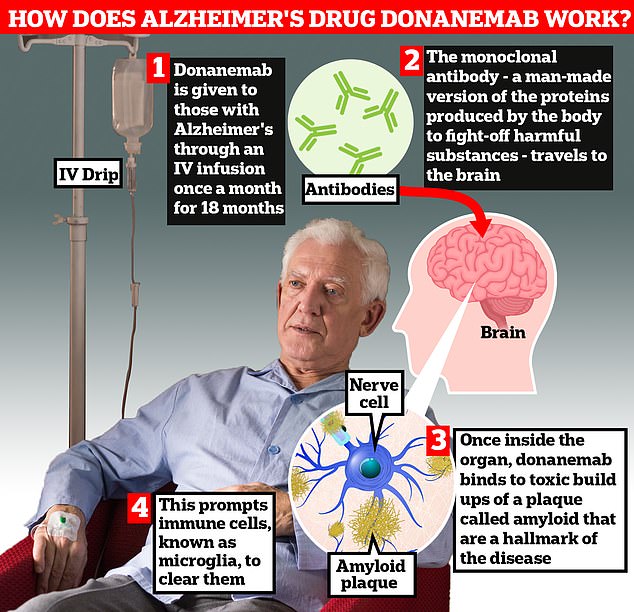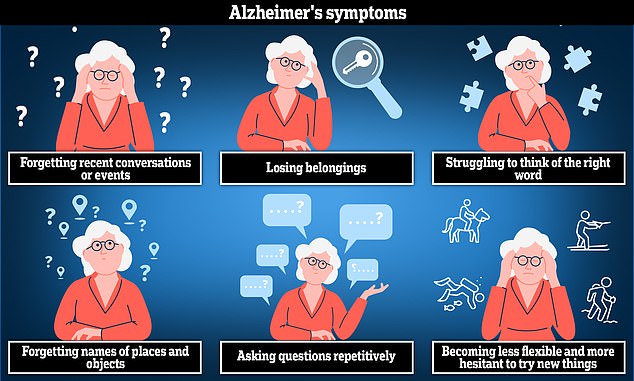Groundbreaking dementia drugs ‘will be 80 per cent useless’, top UK experts warn
More than 80 percent of Britons at risk of Alzheimer’s disease could miss out on revolutionary new drugs to treat the incurable disease, experts warned today.
Donanemab and lecanemab have been proven to slow the progression of the memory-robbing disease in its early stages.
They are expected to be approved for use by the NHS later this year, with all already given the green light in the US.
But a lack of good testing for Alzheimer’s disease at scale means the healthcare system is at risk of being “overwhelmed” by demand for two new drugs, researchers have argued.
Instead, the London scientists estimated that only 14 percent of patients referred to clinics would actually benefit from the treatments.
Studies have shown that the two drugs slow the progression of the disease by as much as 60 percent by helping to remove the buildup of the protein amyloid in the brain.
Experts have long believed they can usher in a new era of dementia treatment by tackling the cause rather than just relieving the symptoms.
Currently, the only available medications for Alzheimer’s disease are to treat symptoms.
The researchers, from University College London (UCL) and Queen Mary University, London, examined the clinical notes of 1,017 NHS patients in the city, including 517 patients assessed in memory services and 500 in a specialist cognitive service.
Just under two-thirds (62 percent) of patients in specialist clinics underwent the necessary liquid biomarker tests.
Once those who wouldn’t be eligible for the treatments due to frailty and other issues were taken into account, they found that four in 10 might be eligible for treatment with the new drugs.
The scientists said this equates to just 14 percent of all cases – or one in seven – assessed in specialist cognitive clinics.
By comparison, only a third (32 percent) of patients in memory services were likely to be referred as potential candidates for the drugs.
Nearly all had undergone brain scans, but only two patients received lumbar punctures – which confirm whether a patient had amyloid and tau proteins associated with Alzheimer’s disease.
Writing in the Journal of Neurology, Neurosurgery and PsychiatryThere is a ‘clear and urgent’ need to improve NHS screening to find out who could benefit from new Alzheimer’s drugs, according to researchers.
Healthcare systems “Actions should be taken to address this potential major discrepancy between referral and final eligibility to avoid overwhelming services,” they added.
In April it was revealed that around 5,000 Britons could get cheap blood tests to detect Alzheimer’s in a bid to revolutionize the NHS’s ‘shocking’ diagnostic figures.
In two groundbreaking studies, researchers from Oxford and University College London will use tests to detect proteins in the blood linked to the disease.
At the time, researchers said they hoped the ‘groundbreaking’ blood test, which costs around £100, could speed up the process, allowing patients to be treated sooner.
The trials, expected to cost around £10 million, will take place across Britain and will involve people who have reported symptoms to their GP and who may be in the early stages of dementia.
David Thomas, head of policy and public affairs at Alzheimer’s Research UK, said today that cheaper, more scalable diagnostics, such as blood tests, are urgently needed.
He said: ‘New drugs for Alzheimer’s disease are finally on the horizon, but to realize their full potential, healthcare systems must be able to offer people with symptoms of dementia accurate and early diagnosis to find out whether these treatments can benefit them come.
‘As this research shows, the NHS is still a long way from being able to carry out these tests routinely.
‘Whoever forms the next government must urgently invest in the NHS to ensure we have the right diagnostics and workforce to help identify people who could benefit from new treatments if these are deemed safe and effective by regulators are considered.’
A report published by NHS England earlier this year said that ‘timely diagnosis of dementia is vital’, with the addition of new blood tests could soon replace lumbar punctures in diagnosing the disease.
It predicts that the number of patients potentially eligible for the drugs will range from 50,000 to 280,000, with an estimated cost of £500 million to £1 billion per year.
However, actual costs will depend on the drug prices agreed for England.
The document states: ‘To be eligible for treatment, patients must first undergo an MRI scan and then a PET-CT scan or a lumbar puncture which confirms the presence of beta-amyloid proteins in the brain, which are linked to Alzheimer’s disease. disease process.’
Dr. Alex Osborne, policy manager at the Alzheimer’s Society, said: ‘These drugs are only available to people in the early stages of Alzheimer’s disease – and more than a third of the 982,000 people with dementia in Britain have no diagnosis at all.
‘That’s why the Alzheimer’s Society is calling on the NHS to publish plans on how it will deliver groundbreaking new treatments to the people who need them, with a specific focus on diagnosis and investment in the tools and staff needed to help eligible identify patients.’
It is thought that around 944,000 people in Britain are living with dementia, while in the US the figure is around 7 million.
Alzheimer’s disease affects about six in ten people with dementia.
It is thought to be caused by a buildup of amyloid and tau in the brain, which clump together, and by plaques and tangles that make it harder for the brain to work properly.
Eventually, the brain struggles to cope with this damage and dementia symptoms develop.
Memory problems, thinking and reasoning problems, and language problems are common early symptoms of the condition, which then worsen over time.
Dementia is expected to explode in the coming years, making a low-cost screening tool crucial to meet the challenge.
An analysis by Alzheimer’s Research UK found that 74,261 people died from dementia in 2022, up from 69,178 a year earlier, making it the country’s biggest killer.
Donanemab and lecanemab (pictured) have both been proven to slow the progression of the memory-robbing disease in its early stages. They are expected to be approved for use by the NHS later this year, with all already given the green light in the US

Studies have shown that the two drugs slow the progression of the disease by as much as 60 percent by helping to remove the buildup of the protein amyloid in the brain. Experts have long believed they can usher in a new era of dementia treatment by tackling the cause rather than just relieving the symptoms

Alzheimer’s disease is the most common cause of dementia. The disease can cause anxiety, confusion and short-term memory loss
